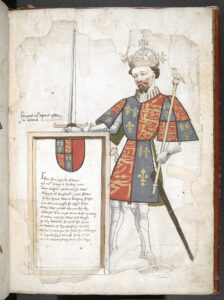
For a long time my only knowledge about Henry IV came from Shakespeare. How typical! I suspect he would have been amazed at how literally we took his memorable characters. Interestingly, although Shakespeare wrote two plays about Henry IV, the king played a minor role in both. It is thought that because Henry was a usurper, the great bard didn’t want to ruffle Queen Elizabeth’s feathers by giving him prominence; too many of his fellow playwrights ended up in prison. Besides, it was much more diverting to give the spotlight to Falstaff! And of course, Prince Hal was safe, since he wasn’t responsible for his father’s actions.
It seems that other scholars followed Shakespeare’s example and gave Henry IV short shrift—possibly because his reign was sandwiched between two much more dynamic kings. Fortunately, modern historians have taken another look and discovered there is plenty to talk about (though much credit is due to the Victorian historian James Hamilton Wylie who wrote a four-volume biography about him. Try finding it!).
Originally, I had only planned to write my first two volumes about Richard II’s life. But I got caught up in the whole usurpation story and realized that Henry’s point of view was just as interesting as Richard’s. It was too much to include in volume two; in fact, Henry’s story covers two books on its own. Naturally, I soon realized that I might as well take the Plantagenets all the way to the end. Every one of them had a story to tell—even Henry VI (we forget that he reigned 40 years).
I found Henry IV’s story to be very sympathetic. Although it was more than a little unethical for him to break Thomas Mowbray’s confidence and start the whole brouhaha that got them exiled (see THE KING’S RETRIBUTION), the punishment was certainly disproportionate to the offense. What was the crime? Why was he declared a traitor? It was all so unfair! Once he returned to reclaim his lost inheritance, he realized that he had to go “all the way” or else risk losing his head to a vindictive Richard. There were to be no half-measures here. Luckily for him, practically the whole country rallied behind his banner.
But that’s only part of the story. All the good-will built up between him and the populace was exhausted pretty quickly. Promises were broken, expectations disappointed, the exchequer was empty, law-and-order disintegrated. Repressive measures led to even more discontent. Poor Henry was quick to learn that that that having the kingship was much less rewarding than striving for it.
But the proverbial die was cast. Once he had established the Lancastrian dynasty, Henry was determined to make it stick. However, on more than one occasion he nearly came to disaster, and his reign might have become the shortest-lasting kingship in English history. The Epiphany Rising—a mere three months after his coronation—and the Battle of Shrewsbury were only two of the rebellions he had to face in the first four years of his reign. And all this happened before the infamous execution of Richard Scrope, Archbishop of York, and Henry’s subsequent attack of leprosy (or so everyone thought). More to come in The Accursed King which I am working on as we speak.